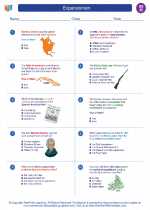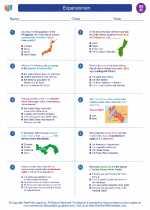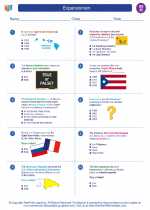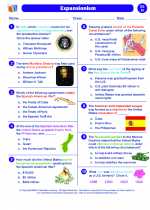Expansionism
Over the past two centuries, the Unites States has sought to expand its territories both in North America and other parts of the world. While one of the biggest reasons for this is to continue economic growth, during the end of the 19th century and the beginning of the 20th, America found itself in a position to demonstrate its strength by intervening in other countries. Read More...
◂Social Studies Worksheets and Study Guides Eighth Grade. Expansionism
Study Guide Expansionism
Expansionism  Worksheet/Answer key
Worksheet/Answer key Expansionism
Expansionism  Worksheet/Answer key
Worksheet/Answer key Expansionism
Expansionism  Worksheet/Answer key
Worksheet/Answer key Expansionism
Expansionism  Worksheet/Answer key
Worksheet/Answer key Expansionism
Expansionism 

 Worksheet/Answer key
Worksheet/Answer key
 Worksheet/Answer key
Worksheet/Answer key
 Worksheet/Answer key
Worksheet/Answer key
 Worksheet/Answer key
Worksheet/Answer key

The resources above cover the following skills:
National Standards for Civics and Government (NSCG)
How does the government established by the constitution embody the purposes, values, and principles of American democracy? What does the national government do?
Major responsibilities for domestic and foreign policy. Students should be able to explain the major responsibilities of the national government for domestic and foreign policy. To achieve this standard, students should be able to
Identify historical and contemporary examples of important foreign policies, e.g., Monroe Doctrine, Marshall Plan, immigration acts, foreign aid, arms control, promoting democracy and human rights throughout the world
National Center for History in Schools (NCHS)
Historical Thinking Standards
Historical Comprehension
Reconstruct the literal meaning of a historical passage.
United States History Content Standards
Era 4: Expansion and Reform (1801-1861)
United States territorial expansion between 1801 and 1861, and how it affected relations with external powers and Native Americans.
The student understands the international background and consequences of the Louisiana Purchase, the War of 1812, and the Monroe Doctrine.
Era 6: The Development of the Industrial United States (1870-1900)
Federal Indian policy and United States foreign policy after the Civil War.
The student understands the roots and development of American expansionism and the causes and outcomes of the Spanish-American War.
World History Content Standards
Era 7: An Age of Revolutions, 1750-1914
Patterns of nationalism, state-building, and social reform in Europe and the Americas, 1830-1914.
The student understands the political, economic, and social transformations in the Americas in the 19th century.